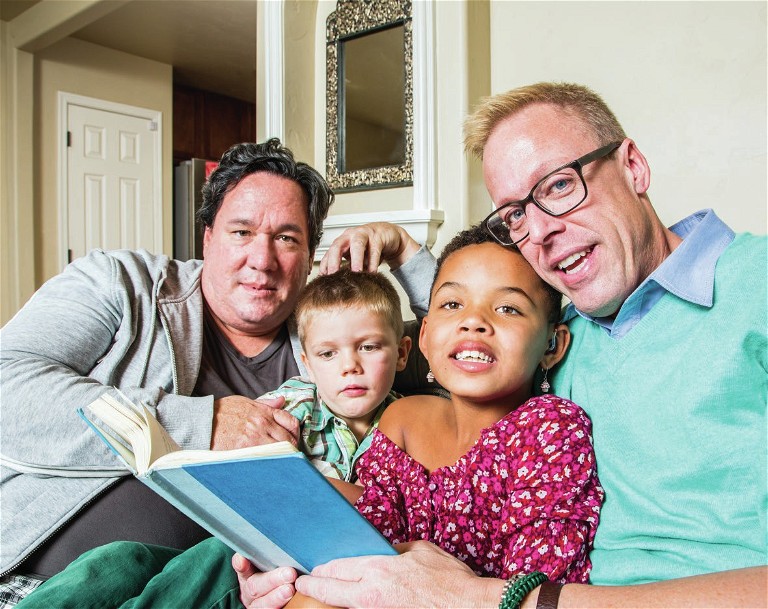Creating the Modern Family
What’s involved for queer couples keen on starting a family today
By Sarah B. Hood

These days, same-sex couples have a host of options available to them if they want to start a family – from adoption all the way to surrogacy. No longer is it a rare thing to come across openly samesex couples with children. In fact, it’s fairly commonplace, and there are many different paths to get there.
The traditional consideration is adoption – same-sex couples in Canada are as eligible to adopt as any other family. “Adoption is regulated by each province and territory, but adoption is open and inclusive to all Canadians, including singles and same-sex couples,” says Cathy Murphy, executive director of the Adoption Council of Canada, based in Ottawa.
That said, it remains a challenging option for those who have their hearts set on healthy young infants. In most cases, couples need to be prepared to make a commitment to an older child who may have had a difficult start in life. With better reproductive education and less stigma about children born outside marriage, “it is very difficult to find a healthy newborn to adopt in Canada,” says Ellen Embury, partner with Carbert Waite LLP, a Calgary-based law firm with expertise in surrogacy and fertility.
“If you are comfortable working with public adoption agencies who are typically placing children who are older and may have come from a background of abuse, that’s an amazing and wonderful thing,” adds Embury.
“But many couples feel that’s not something they want to do.”
“Most of the children waiting for permanency are over the age of 12,” notes Murphy. “They may be living with siblings, and they may be living with visible or invisible disabilities, like fetal alcohol spectrum disorder. Most will have experienced developmental trauma just because they have been part of the child welfare system in Canada.”
Those couples who do choose to adopt will encounter a far more open and transparent system. Children are no longer routinely given up for adoption with the assumption that they will never know their birth parents, for instance. “Adoption disclosure records have been opened by the provinces, so open adoptions are what adoption looks like in Canada now,” states Murphy.

“ Adoption disclosure records have been opened by the provinces, so open adoptions are what adoption looks like in Canada now ”
-CATHY MURPHY ADOPTION COUNCIL OF CANADA

The second significant social shift is a stronger focus on the interests of the child. “We really have to look at the best interests of children and youth,” Murphy says. “We’re looking for people for children and youth, and not youth and children for people.”
While the system has shifted to normalize same-sex adoption in Canada, the same cannot be said on the international front. International adoption is the option least open to queer couples – especially if they are intent on adopting jointly. The general rule of thumb is that countries that don’t recognize same-sex marriage will not permit samesex parents to adopt. “An example would be China,” Murphy says. “Single parents have always been able to adopt from China, but not same-sex couples.” This is the case with most Asian countries, including South Korea, Thailand and India.
Countries that currently allow gay adoption from foreigners include Colombia and Brazil, however regulations change regularly. Couples interested in this option need to work with a reputable international adoption agency to work through the details and understand all their options.
OTHER OPTIONS
Outside of adoption, female same-sex couples have the relatively easy choice of sperm donation – either from a friend or an agency. Easy from a physical perspective, but less so from a legal one. The legal ramifications can be complex, especially when it comes to parental rights. “Many provinces have a regulation that if the method of sperm donation is other than sexual intercourse, there is no assumption of parental rights,” explains Embury.
For that reason, Embury recommends seeking out sound legal advice and discussing all future expectations clearly. Talks should take into consideration whether the sperm donor or their family members will have any relationship with the child and whether the child will be told the truth about their parentage. It is wise to enshrine these discussions in a comprehensive donor agreement.
THE COST OF BUILDING A FAMILY
Financially, the decision to become a parent is no small matter. Apart from the diapers, cribs, car seats and teddy bears required by any child, there are additional costs for couples who don’t have the option to conceive naturally.
“In Canada, if you want to pursue egg donation and surrogacy, usually you could expect to pay in the range of $70,000 to $110,000,” says Ellen Embury, partner with Carbert Waite LLP. (In terms of surrogacy, couples cannot pay someone to have their baby, but they can cover their pregnancy expenses.) “Sperm donation costs are astronomically lower, because there is no involvement of socialservice agencies.
” “If you’re adopting through the child welfare system, there is no cost, but most families make a donation to the Children’s Aid Foundation. There may also be costs associated with therapy, so looking at your benefits is really important,” says Cathy Murphy of the Adoption Council of Canada. “With a private domestic adoption, using a licensed agency or a lawyer, the cost is $25,000 to $30,000,” says Murphy. “There’s a cost of $35,000 to $70,000 for international adoptions, depending on how long you have to live in the child’s country; sometimes you have to stay for quite a while. For in-vitro fertilization, it costs $5,000 to $7,000 per treatment.” Often multiple attempts are needed.

“ Many provinces have a regulation that if the method of sperm donation is other than sexual intercourse, there is no assumption of parental rights ”
-ELLEN EMBURY CARBERT WAITE LLP
“There is a perception that because someone is either an egg or sperm donor, there is a presumption of parentage and that is wrong, in most provinces, by statute,” stresses Embury. “If a donor does try to assert some level of parentage… there would have to be something other than donated eggs, such as that the couple has allowed the donor into the child’s life.”
For male same-sex couples, surrogacy, regulated federally in Canada, is a fairly obvious choice. But while surrogacy is allowed in Canada, it is firmly illegal to pay a surrogate within Canada. That said, certain reimbursable expenses related to the pregnancy process are allowed, and Health Canada does not specify in detail what is or isn’t considered a legitimate expense.
There may be different interpretations, but expenses normally covered include medications, travel, legal counsel, specialty food, lost wages and maternity clothing, to name a few.
As with sperm and egg donation, it’s important to set the ground rules. The couple has some rights to make requests about how the surrogate will take care of herself and the child while pregnant, such as asking her to abstain from alcohol and tobacco. Should something go wrong, however, the couple may not pressure the surrogate to terminate a pregnancy, and all parties need to agree in advance on a dispute-resolution process. There are many considerations, and one needs to go into the process with eyes wide open.
Ultimately, building a family today is far different from what it once was, and it’s more open and accessible for queer couples. As Murphy sums up, “What defines a family is much more up to individuals.” ■